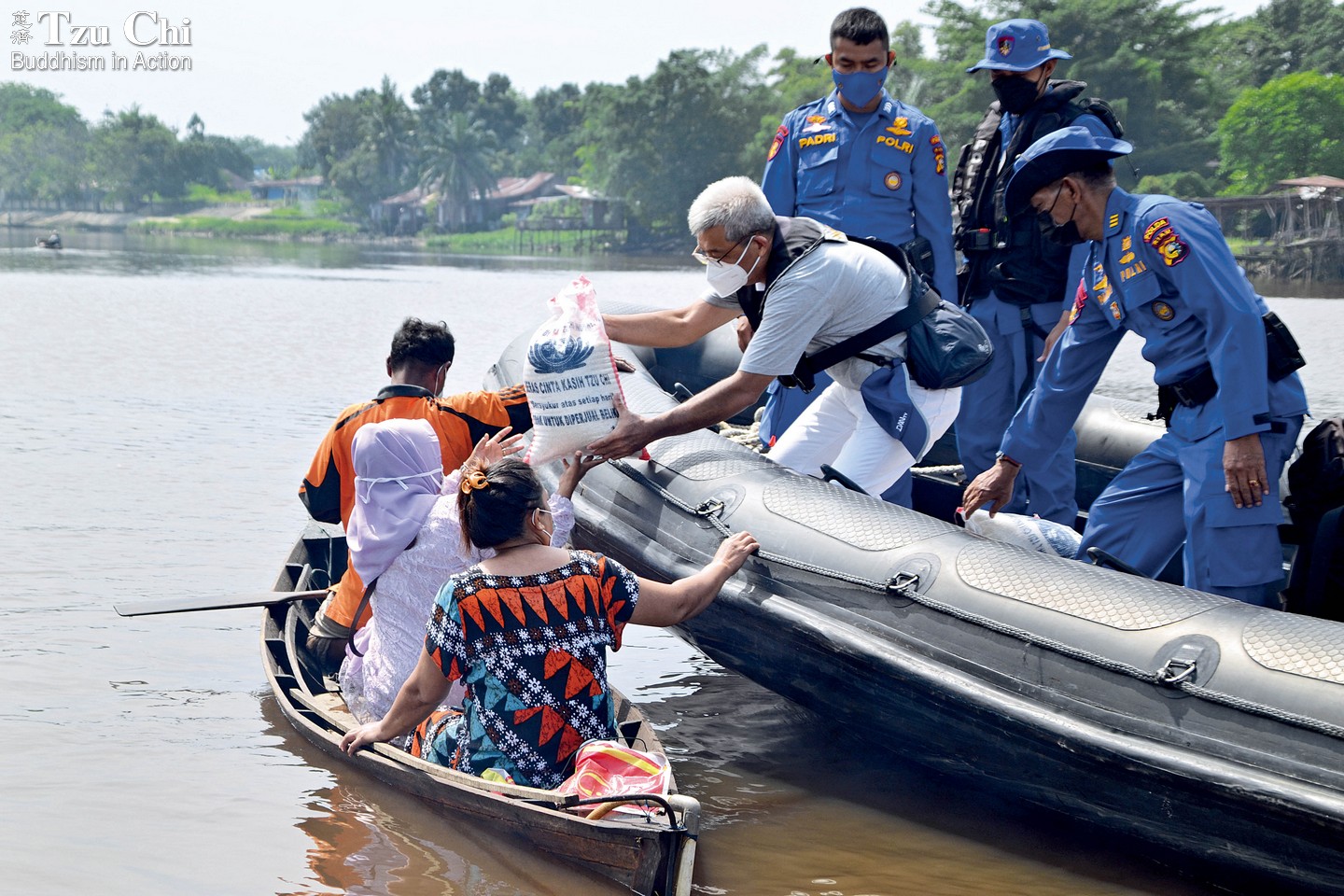Text and photo provided by Tzu Chi Indonesia
Translated by Wu Hsiao-ting
One feels small and insignificant faced with the massive impact of the coronavirus crisis. But the pandemic also brought forth an outpouring of love, enabling support to reach the underprivileged across the nation.
According to information released in April 2021 by Lapor COVID-19, an independent data initiative in Indonesia, nearly a thousand doctors and nurses in the nation had died by that time from COVID. Though more than a year had passed since the infection broke out, no one could have predicted that another wave was just around the corner. The large number of people returning home in mid-May 2021 for the Muslim festival of Eid al-Fitr, which marks the end of the holy month of Ramadan, ushered in a second wave of the coronavirus in Indonesia. It was exacerbated by the rapid transmission of the Delta variant. The peak came in mid-July, with more than 50,000 new cases reported each day. One-fourth of those new cases occurred in Jakarta, the capital. It wasn’t until late August that the daily infection rate began to significantly decline. Even so, the country’s case count had topped four million by August 24.
The sharp spike in confirmed cases impacted Indonesia’s medical system. The emergency room at Tzu Chi Great Love Hospital in Cengkareng, West Jakarta, was overwhelmed. Dr. Adrianus Kanasis, leader of the anti-COVID team at the hospital, said that his cell phone rang incessantly every day during that time, from early morning to midnight. Some people were calling to inquire if they could get a bed in the hospital; others were seeking help because they or their loved ones had contracted COVID-19. Kanasis worked long hours through those days, and if being overworked wasn’t bad enough, his brother and his entire family were diagnosed with the disease and hospitalized. That critical time was hard on Kanasis, but he wasn’t the only medical worker mentally and physically exhausted. The situation was typical among those in his line of work.
In response to the second wave, Indonesia Tzu Chi Hospital, a new Tzu Chi medical facility originally scheduled to open for a trial run on October 1, set up a pandemic center and started serving COVID patients on June 14. The center opened with 56 beds, all of which were occupied within a day. An even greater challenge came when one third of the medical personnel at Tzu Chi Great Love Hospital and Indonesia Tzu Chi Hospital were diagnosed with COVID, one after another. Tzu Chi Indonesia quickly offered a vacant building at Tzu Chi Great Love Hospital—slated to be used as a dormitory for the hospital’s nursing staff—to temporarily serve as an isolation facility for Tzu Chi employees and other patients with mild symptoms.

On October 5, 2021, with the help of maritime police officers, Tzu Chi volunteers in Pekanbaru, the capital of the province of Riau, distributed 300 bags of rice, each weighing ten kilograms, to fishermen and other laborers who lived along the Siak River and whose livelihoods had been affected by the pandemic.
Patients had a hard time getting a hospital bed with the medical system in Indonesia overwhelmed by the second wave. The demand for medical oxygen outstripped the supply too, resulting in patient deaths. Tzu Chi headquarters in Taiwan promptly bought 5,000 oxygen concentrators to help. The equipment was purchased in China and transported via chartered flights to Indonesia, then sent by Tzu Chi Indonesia to medical institutions across the nation.
“No one could have known that Indonesia would have suffered such a huge impact from the pandemic,” said Sugianto Kusuma (郭再源), deputy CEO of Tzu Chi Indonesia. “Master Cheng Yen has said this pandemic is like a grand lesson for us all, helping us to realize how small and insignificant human beings are. For Tzu Chi Indonesia, however, the pandemic also brought forth an outpouring of love.” Kusuma explained that when the coronavirus infection broke out in March 2020, many entrepreneurs in Indonesia responded to Tzu Chi’s appeal and donated money to buy ventilators and personal protective equipment (PPE) for front-line workers. “Our hearts ached when we learned that many health professionals were wearing raincoats because they were short on protective clothing,” said the deputy CEO. After buying desperately needed medical equipment and PPE, Tzu Chi worked with the military and police to deliver the items to over a thousand hospitals and 284 government health agencies in 25 provinces.
The donation of medical supplies and equipment aside, Tzu Chi Indonesia has also been helping the underprivileged weather the pandemic. In February 2021, to mark the Chinese New Year, Tzu Chi and the business sector together launched a project to give out a million gift packs, each containing a ten-kilogram (22-pound) bag of rice and 20 medical masks, to destitute families. Another aid project was started by the foundation in August to buy vegetarian boxed meals from vendors impacted by the pandemic and give them to the needy. As of October 2021, more than 32,000 meals had been purchased and distributed to those in need.
Isha, a vendor in Surabaya, Indonesia’s second largest city, was one of those who benefited from this project. “When I received Tzu Chi’s order,” he said, “I was so happy I couldn’t fall asleep. I kept wondering if this was reality or a dream. I decided to give a discount so I could help others too. I hope I can help spread happiness through this Tzu Chi activity.”



